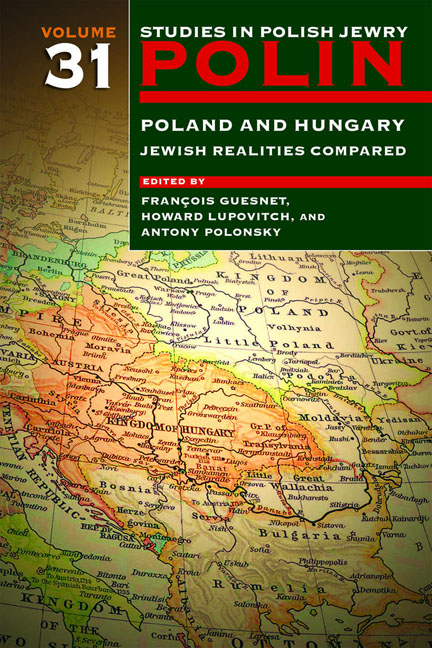Book contents
- Frontmatter
- Dedication
- Editors and Advisers
- Preface
- Polin
- Polin: Studies in Polish Jewry
- Contents
- Note on Place Names
- Note on Transliteration
- Part I POLAND AND HUNGARY: JEWISH REALITIES COMPARED
- JEWISH ACCULTURATION AND INTEGRATION
- JEWISH RELIGIOUS LIFE
- JEWS IN POPULAR CULTURE
- THE INTERWAR YEARS
- THE HOLOCAUST AND ITS AFTERMATH
- PERSONAL REFLECTIONS
- Part II NEW VIEWS
- Part III OBITUARIES
- Notes on the Contributors
- Index
Jews in Museums: Narratives of Nation and ‘Jewishness’ in Post-Communist Hungarian and Polish Public Memory
- Frontmatter
- Dedication
- Editors and Advisers
- Preface
- Polin
- Polin: Studies in Polish Jewry
- Contents
- Note on Place Names
- Note on Transliteration
- Part I POLAND AND HUNGARY: JEWISH REALITIES COMPARED
- JEWISH ACCULTURATION AND INTEGRATION
- JEWISH RELIGIOUS LIFE
- JEWS IN POPULAR CULTURE
- THE INTERWAR YEARS
- THE HOLOCAUST AND ITS AFTERMATH
- PERSONAL REFLECTIONS
- Part II NEW VIEWS
- Part III OBITUARIES
- Notes on the Contributors
- Index
Summary
SINCE the 1989 collapse of communism in eastern Europe, newly democratic societies in the region have been struggling to come to terms with their twentiethcentury past. These efforts, taking place in official politics, public spaces, historical scholarship, film, literature, and art, have become the subject of a vast scholarly literature, ranging from history to sociology and political theory to literary studies. In most east European countries, the Holocaust has emerged as one of the focal points of public memory debates. Taboo or remembered through ideologically motivated distortion under communist rule, the Holocaust became a central moral paradigm and symbol of mass murder in the West. As a result, post-communist east European societies eager to join the West must come to terms with the West's interpretation and figure out how it relates to their own experiences and memories of the Second World War and communism.
In Poland and Hungary, home to two of the largest Jewish communities in Europe both before and after the Second World War, the Holocaust has emerged as a central problem for their national identities in the post-communist decades. The efforts of the two countries to come to terms with this past share many similarities: in both countries, the interwar years, the Second World War, the country's treatment of Jews, and its role in the Holocaust have been the source of controversy. Both countries have searched for a usable past but have found a shared memory elusive, and post-communist re-evaluations have, in both countries, failed to entirely supplant pre-war ideologies and communist histories. Despite these similarities, there are also significant differences in the way Poland and Hungary have dealt with their past. In Poland, the public debate about the past has focused on the war and the role of Polish society in the Holocaust. In Hungary, the most controversial period is the interwar years, and, although there is relatively little discussion about the role of the Hungarian state in the Holocaust, no significant public debate has taken place about society's role and responsibility. In terms of finding a place for the Jewish past in their national narratives, the two countries are struggling with somewhat different problems. This difference reflects the divergence in their histories before the Second World War, under communism, and the histories of their respective Jewish communities, especially with regards to assimilation.
- Type
- Chapter
- Information
- Polin: Studies in Polish Jewry Volume 31Poland and Hungary: Jewish Realities Compared, pp. 481 - 502Publisher: Liverpool University PressPrint publication year: 2018

